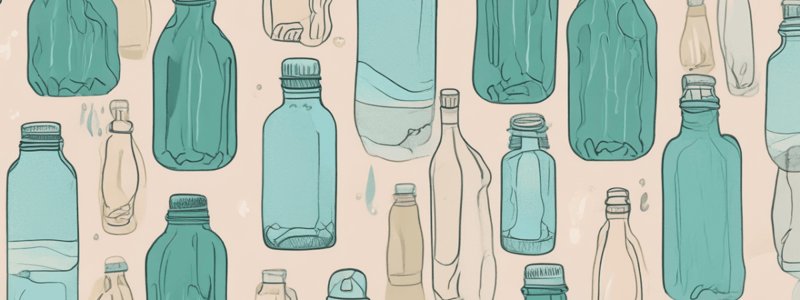Podcast
Questions and Answers
What type of material is commonly used to make eco-friendly water bottles?
What type of material is commonly used to make eco-friendly water bottles?
- Polypropylene (PP)
- Food-grade stainless steel
- Polyethylene terephthalate (PET)
- Soda-lime glass (correct)
What is a benefit of using reusable water bottles?
What is a benefit of using reusable water bottles?
- Increases water intake
- Keeps drinks hot or cold for hours
- Reduces plastic waste (correct)
- Convenient for outdoor activities
What feature should you consider when choosing a water bottle for outdoor activities?
What feature should you consider when choosing a water bottle for outdoor activities?
- Collapsible design (correct)
- Capacity
- Insulation
- Mouthpiece
Flashcards are hidden until you start studying
Study Notes
Types of Water Bottles
- Plastic Water Bottles: Made from polyethylene terephthalate (PET) or polypropylene (PP), these bottles are lightweight, inexpensive, and widely used. However, they contribute to plastic pollution and are not recyclable.
- Stainless Steel Water Bottles: Made from food-grade stainless steel, these bottles are durable, resistant to corrosion, and keep drinks hot or cold for hours. They are also eco-friendly and can be recycled.
- Glass Water Bottles: Made from soda-lime glass or borosilicate glass, these bottles are non-toxic, eco-friendly, and preserve the taste of water. However, they are heavier and more prone to breakage than other materials.
- Collapsible Water Bottles: Made from silicone or TPU, these bottles are lightweight, flexible, and compact. They are ideal for outdoor activities and travel.
Features to Consider
- Insulation: Look for bottles with double-walled or vacuum-insulated designs to keep drinks at the desired temperature.
- Capacity: Choose a bottle that fits your needs, ranging from 12 oz to 64 oz or more.
- Mouthpiece: Consider bottles with wide mouths for easy sipping and cleaning, or narrow mouths for spill-proofing.
- Lid and Closure: Look for bottles with leak-proof lids, screw-on caps, or flip-top lids for easy access.
Benefits of Using Water Bottles
- Reduces Plastic Waste: Refusing single-use plastic bottles and opting for reusable water bottles helps reduce plastic pollution.
- Saves Money: Reusing water bottles can save money on buying bottled water.
- Encourages Hydration: Having a water bottle nearby can encourage people to drink more water throughout the day.
- Convenient: Water bottles are portable and easy to use on-the-go.
Types of Water Bottles
- Plastic water bottles are made from polyethylene terephthalate (PET) or polypropylene (PP), making them lightweight and inexpensive, but contributing to plastic pollution and non-recyclable.
- Stainless steel water bottles are made from food-grade stainless steel, making them durable, resistant to corrosion, and able to keep drinks hot or cold for hours, plus they are eco-friendly and recyclable.
- Glass water bottles are made from soda-lime glass or borosilicate glass, making them non-toxic, eco-friendly, and preserving the taste of water, but heavier and more prone to breakage than other materials.
- Collapsible water bottles are made from silicone or TPU, making them lightweight, flexible, and compact, ideal for outdoor activities and travel.
Features to Consider
- Insulation: Double-walled or vacuum-insulated designs keep drinks at the desired temperature.
- Capacity: Bottles come in various sizes, ranging from 12 oz to 64 oz or more.
- Mouthpiece: Wide mouths are easy for sipping and cleaning, while narrow mouths are spill-proof.
- Lid and Closure: Leak-proof lids, screw-on caps, or flip-top lids provide easy access.
Benefits of Using Water Bottles
- Reduces Plastic Waste: Refusing single-use plastic bottles and opting for reusable water bottles helps reduce plastic pollution.
- Saves Money: Reusing water bottles can save money on buying bottled water.
- Encourages Hydration: Having a water bottle nearby can encourage people to drink more water throughout the day.
- Convenient: Water bottles are portable and easy to use on-the-go.
Studying That Suits You
Use AI to generate personalized quizzes and flashcards to suit your learning preferences.




